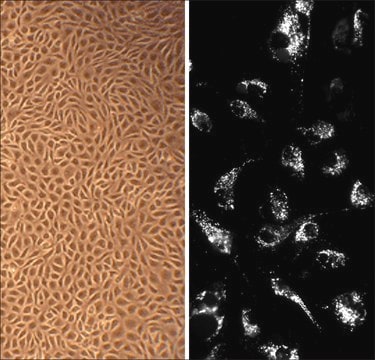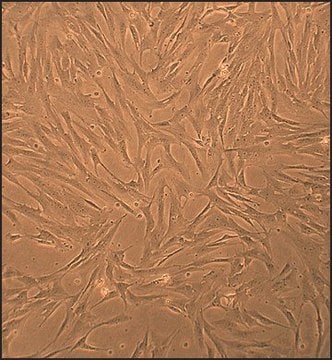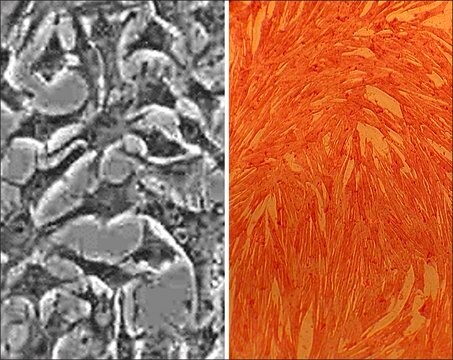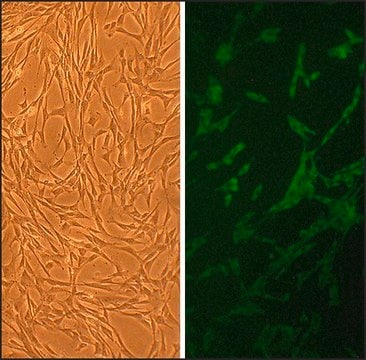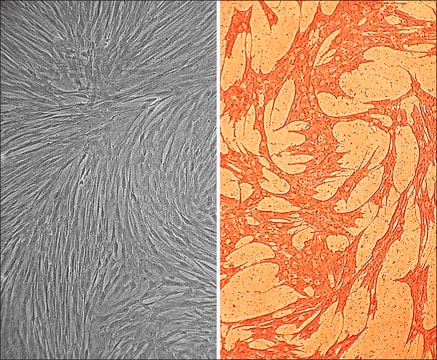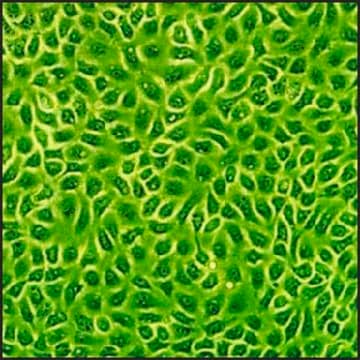P300-05
Porcine Coronary Artery Endothelial: PCAEC (Cryovial)
Se connecterpour consulter vos tarifs contractuels et ceux de votre entreprise/organisme
About This Item
Code UNSPSC :
41106514
Nomenclature NACRES :
NA.81
Produits recommandés
Source biologique
Porcine coronary artery
Niveau de qualité
Forme
solid
Conditionnement
pkg of 500,000 cells
Fabricant/nom de marque
Cell Applications, Inc
Mode de croissance
Adherent
Caryotype
2n = 38
Morphologie
Endothelial
Technique(s)
cell culture | mammalian: suitable
Maladie(s) pertinente(s)
cardiovascular diseases
Conditions d'expédition
dry ice
Température de stockage
−196°C
Description générale
Lot specific orders are not able to be placed through the web. Contact your local sales rep for more details.
Arterial endothelial cells play critical roles in cardiac homeostasis, and insults to the endothelial cells have been linked to a variety of vascular diseases. Porcine artery endothelial cells provide a useful tool to study artery endothelial function and metabolism.PCAEC from Cell Applications, Inc. have been used to investigate a new mechanism of obesity-associated vascular disease by demonstrating that resistin, an adipocyte-derived cytokine implemented in insulin resistance and diabetes, can cause endothelial dysfunction in coronary arteries through oxidative stress and down-regulation of NO synthase (Kougias, 2005). Conversely, secretoneurin was shown to activate expression of NO synthase and calmodulin, leading to endothelial relaxation (Chan, 2011). PCAEC were also used in adhesion and transmigration experiments in a study investigating anti-inflammatory, cardioprotective effects of a novel adenosine-lidocaine drug formulation (Shi, 2012).
Arterial endothelial cells play critical roles in cardiac homeostasis, and insults to the endothelial cells have been linked to a variety of vascular diseases. Porcine artery endothelial cells provide a useful tool to study artery endothelial function and metabolism.PCAEC from Cell Applications, Inc. have been used to investigate a new mechanism of obesity-associated vascular disease by demonstrating that resistin, an adipocyte-derived cytokine implemented in insulin resistance and diabetes, can cause endothelial dysfunction in coronary arteries through oxidative stress and down-regulation of NO synthase (Kougias, 2005). Conversely, secretoneurin was shown to activate expression of NO synthase and calmodulin, leading to endothelial relaxation (Chan, 2011). PCAEC were also used in adhesion and transmigration experiments in a study investigating anti-inflammatory, cardioprotective effects of a novel adenosine-lidocaine drug formulation (Shi, 2012).
Origine de la lignée cellulaire
Artery
Application
cardiovascular function, angiogenesis, vascular biology, regulation of coronary blood flow, cardiac functions, effects of vaso-dilators, coagulation, fibrinolysis, vessel wall tone, cytokine production
Composants
Porcine Endothelial Cell Growth Medium that contains 10% FBS and 10% DMSO
Notes préparatoires
- 2nd passage, >500,000 cells in Porcine Endothelial Cell Growth Medium that contains 10% FBS and 10% DMSO
- Can be cultured at least 12 doublings
Procédure de repiquage
Please refer to the PCAEC Culture Protocol.
Code de la classe de stockage
11 - Combustible Solids
Classe de danger pour l'eau (WGK)
WGK 3
Point d'éclair (°F)
Not applicable
Point d'éclair (°C)
Not applicable
Certificats d'analyse (COA)
Recherchez un Certificats d'analyse (COA) en saisissant le numéro de lot du produit. Les numéros de lot figurent sur l'étiquette du produit après les mots "Lot" ou "Batch".
Déjà en possession de ce produit ?
Retrouvez la documentation relative aux produits que vous avez récemment achetés dans la Bibliothèque de documents.
Notre équipe de scientifiques dispose d'une expérience dans tous les secteurs de la recherche, notamment en sciences de la vie, science des matériaux, synthèse chimique, chromatographie, analyse et dans de nombreux autres domaines..
Contacter notre Service technique